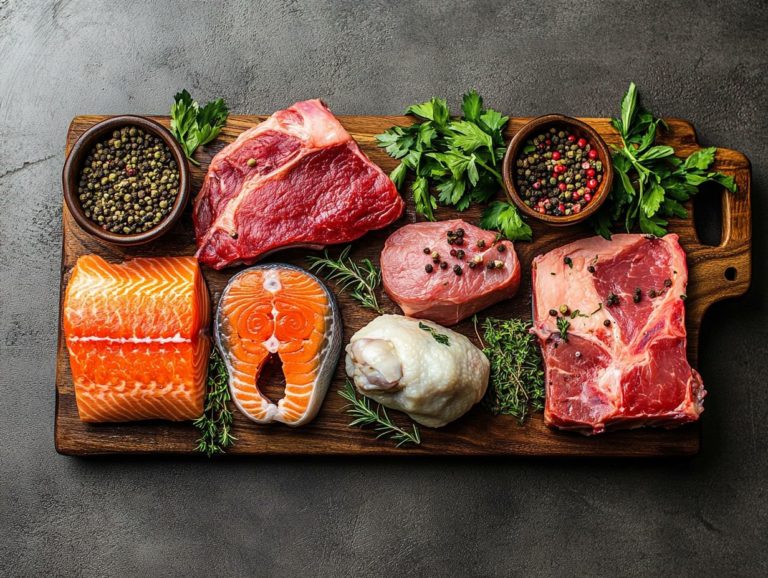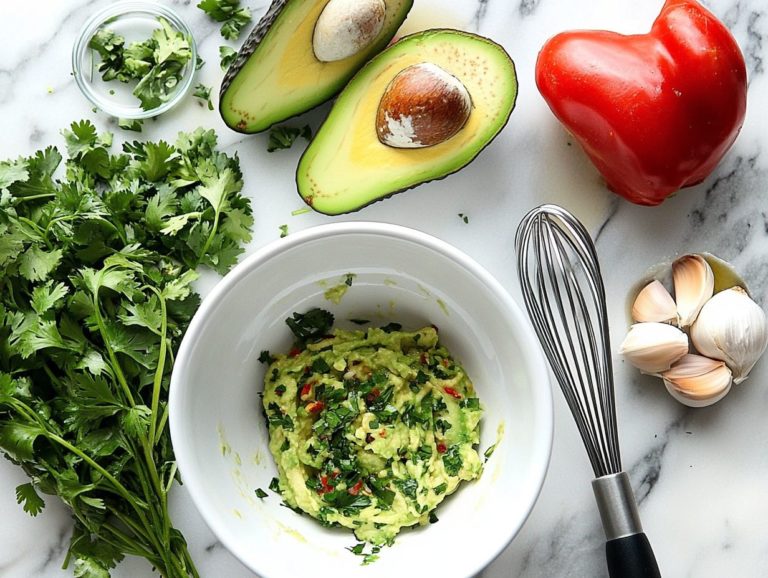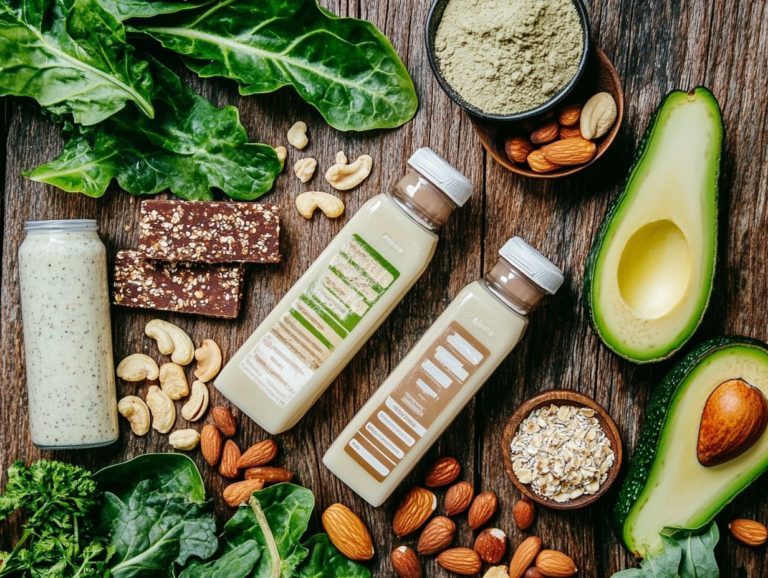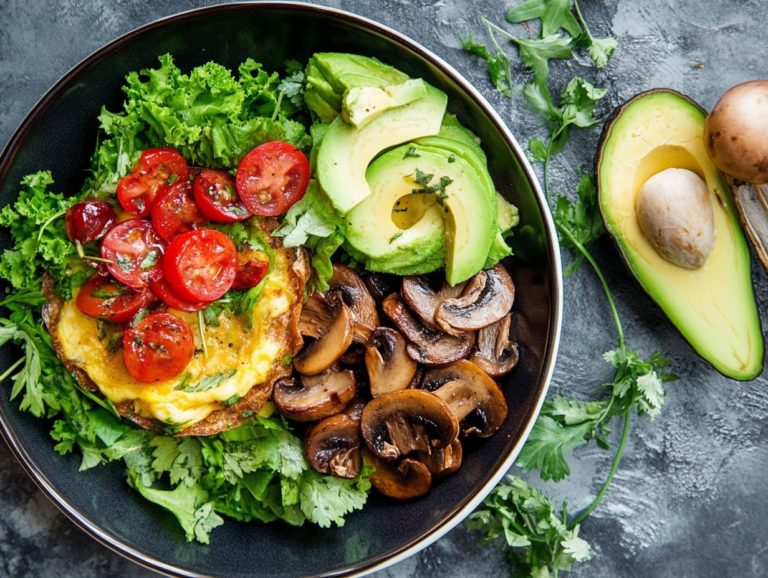The Role of Protein in a Keto Diet
The keto diet has surged in popularity, renowned for its ability to promote weight loss, regulate blood sugar, and enhance overall health.
Central to this low-carb, high-fat approach is the pivotal role of protein. By grasping how protein operates within the keto framework, you can unlock its full potential whether it s supporting weight loss, muscle growth, or amplifying feelings of satiety.
This article delves into the significance of protein in a keto diet, providing valuable insights on optimal intake, ideal sources, and the necessary balance to maintain ketosis and manage blood sugar levels.
Contents
- Key Takeaways:
- What is a Keto Diet?
- How Does a Keto Diet Work?
- The Importance of Protein in a Keto Diet
- The Role of Protein in Weight Loss on a Keto Diet
- Protein and Muscle Building on a Keto Diet
- The Connection Between Protein and Satiety on a Keto Diet
- Potential Risks of Consuming Too Much Protein on a Keto Diet
- The Role of Protein in a Keto Diet
- How to Incorporate Protein into a Keto Diet
- Frequently Asked Questions
- What is the role of protein in a keto diet?
- How much dietary protein should be consumed in a keto diet?
- Can too much dietary protein kick you out of ketosis?
- What are some good protein sources for a keto diet?
- Is it necessary to track protein consumption on a keto diet?
- Can a protein deficit in a keto diet be harmful?
Key Takeaways:
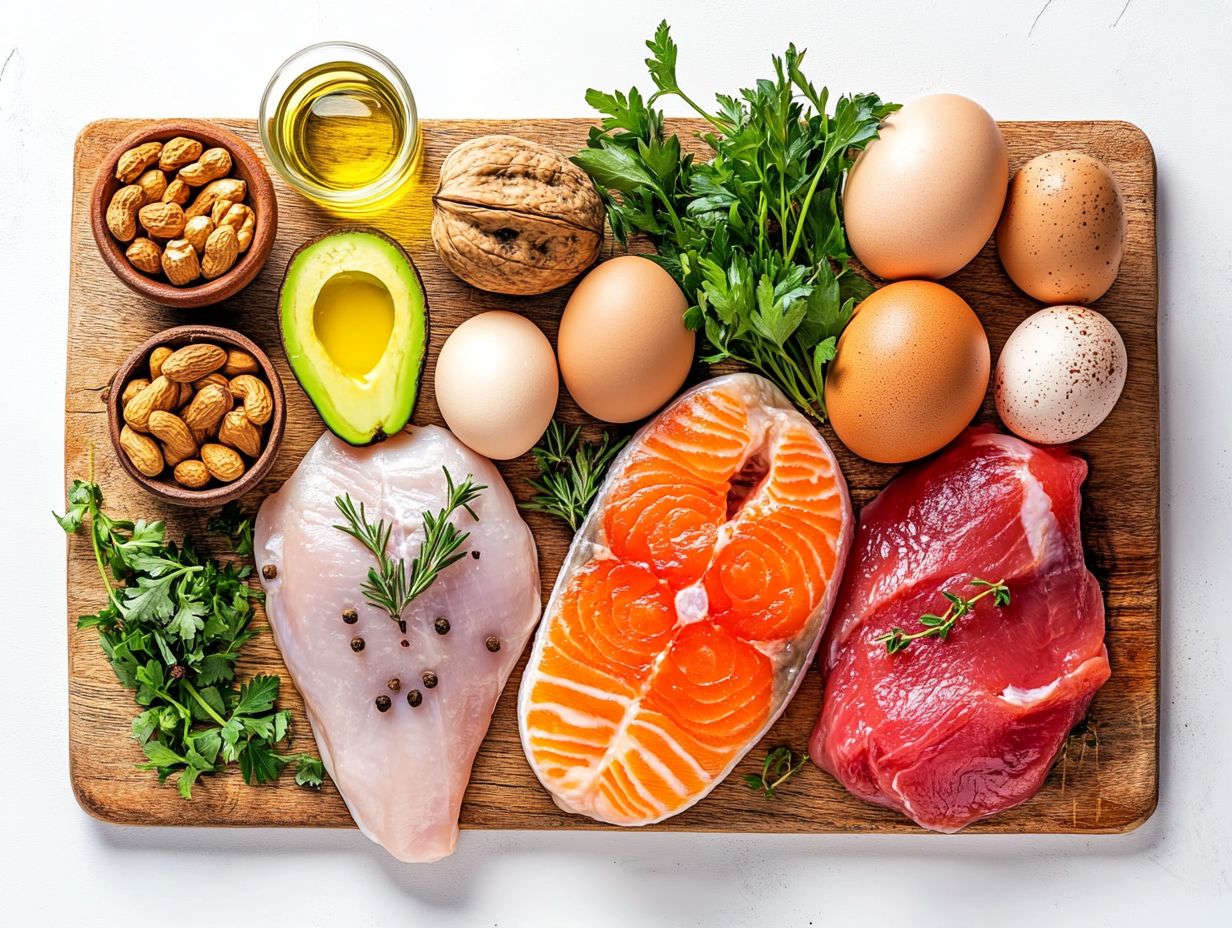
- Protein is crucial in a keto diet for weight loss and muscle building.
- Aim for 20-25% of daily calorie intake to come from dietary protein.
- Choose protein sources such as meat, fish, eggs, and tofu on a keto diet.
What is a Keto Diet?
The Keto Diet, or ketogenic diet, is a low-carb approach that prioritizes high-fat and moderate protein intake. This effectively nudges your body into a state called ketosis.
In this state, your body transforms into a fat-burning powerhouse, relying on fat for energy instead of carbohydrates. This dietary strategy has surged in popularity due to its potential benefits in weight management, blood sugar regulation, and overall wellness. Many choose this diet to quickly shed pounds and boost their health!
By significantly cutting down on carbohydrates and replacing them with fats, you enable your body to enter ketosis, which can boost fat metabolism and help you manage your appetite more effectively.
How Does a Keto Diet Work?
A Keto Diet operates by drastically cutting down on carbohydrate intake while elevating fat consumption. This guides your body into a metabolic state known as ketosis, where fat becomes the primary energy source.
During this transformative process, your liver breaks down fatty acids and produces ketones, which serve as a valuable alternative fuel for your brain and other tissues. As your carbohydrate levels decline, insulin secretion drops, enabling your body to tap into its stored fat reserves for energy.
This hormonal shift promotes efficient fat metabolism and can also help curb your appetite, making it easier to manage your caloric intake and maintain a healthy weight.
As your energy levels stabilize, you may find yourself enjoying enhanced focus and endurance, underscoring the remarkable metabolic transition that accompanies the adoption of a ketogenic lifestyle.
The Importance of Protein in a Keto Diet
Protein plays a pivotal role in your Keto Diet. It serves as a source of essential amino acids vital for muscle growth and repair and is key in maintaining muscle mass during weight loss. It also influences protein synthesis, metabolism, and overall dietary balance.
For those following a low-carb diet, adequate protein intake is essential. It supports your energy levels, enhances satiety, and aids in appetite control, ensuring your body has the essential building blocks for muscle tissue and enzymes.
By understanding your protein requirements and incorporating a diverse range of protein sources, you can truly optimize the health benefits of the ketogenic diet.
Start your keto journey today and ensure that you are getting enough protein to support your body s needs!
How Much Protein Should Be Consumed on a Keto Diet?
Determining how much protein you should consume on a Keto Diet depends on your individual goals, activity levels, and body composition. However, dietary guidelines generally recommend a moderate protein intake that aligns with your specific targets to support muscle repair, metabolism, and overall health.
For most active individuals, a protein intake ranging from 20% to 30% of your total daily calories is typically recommended. This translates to approximately 1.2 to 2.0 grams of protein per kilogram of body weight. If you’re aiming for weight loss, focus on the lower end of this range. This approach helps maintain a caloric deficit while ensuring you receive adequate nutrients for muscle preservation.
Your activity level whether you are sedentary, moderately active, or highly active significantly impacts how much protein you truly need to meet your nutritional goals. Fine-tuning your protein intake can help you work towards achieving your personal fitness aspirations.
Best Protein Sources for a Keto Diet
The finest sources of dietary protein for your Keto Diet include both animal and plant protein options. Think of meat, fish, eggs, nuts, seeds, and dairy as allies in providing high-quality protein and essential amino acids vital for muscle growth, repair, and overall well-being.
Incorporating a diverse array of these protein-rich foods meets your dietary needs and elevates the overall nutritional profile of your meals. Animal proteins like lean cuts of beef, chicken, and fatty fish deliver complete proteins containing all essential amino acids in optimal ratios, making them an excellent choice for muscle maintenance.
Plant-based proteins found in nuts and seeds may be lower in certain amino acids, but they come loaded with fiber and healthy fats, offering additional health benefits. By including a balanced mix of both, you can effectively meet your protein requirements while supporting a stable state of ketosis.
The Role of Protein in Weight Loss on a Keto Diet
Ready to lose weight effectively? Protein is your best friend on a Keto Diet, offering significant health benefits and aiding in fat loss. It enhances satiety, helps preserve muscle, and promotes fat loss. These factors create an effective weight control strategy that aligns perfectly with the principles of a low-carb diet.
How Does Protein Help with Weight Loss on a Keto Diet?
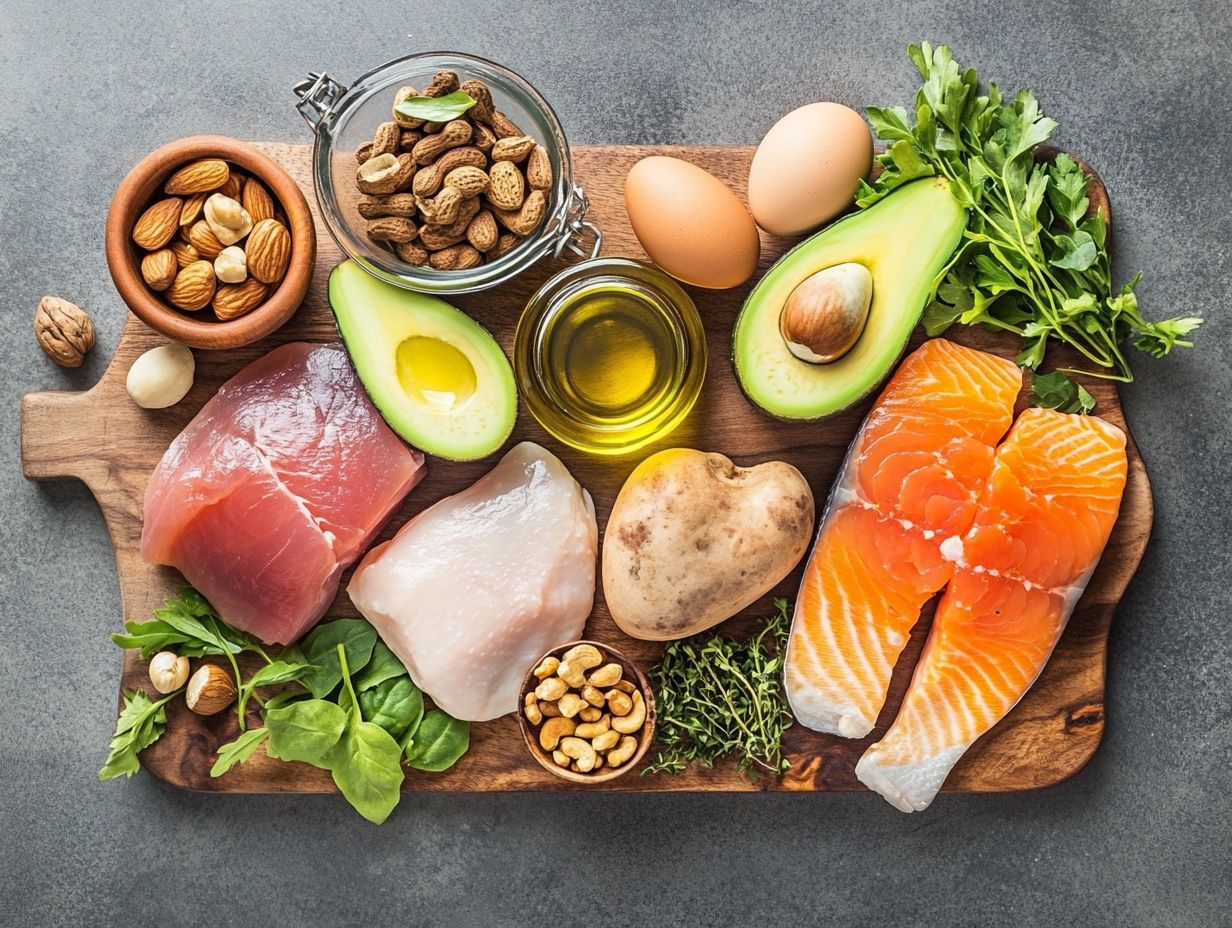
Protein promotes feelings of fullness, enhances your metabolic rate, and preserves muscle tissue even when you’re cutting calories. This makes it an effective strategy for type 2 diabetes management and supports better weight management while improving your body composition.
This crucial nutrient affects hormones that control hunger, like ghrelin and peptide YY. These hormones help reduce hunger and increase satiety after meals, making it easier to control food intake. By incorporating adequate protein into your daily diet, you can significantly boost thermogenesis the body’s heat production process leading to more calories burned.
Supporting muscle retention during weight loss helps maintain a healthy metabolic rate, making it easier for you to sustain weight loss over time. These mechanisms highlight how protein intake can be a powerful component in achieving and maintaining a healthier body composition.
Start incorporating these protein sources into your diet today for better results!
Can Too Much Protein Kick You Out of Ketosis?
While protein is undoubtedly a key player in a Keto Diet, it’s essential to recognize that consuming too much can actually disrupt your state of ketosis. When you consume protein in excess, your body may resort to converting surplus amino acids into glucose through gluconeogenesis, effectively kicking you out of that desired low-carb state.
Striking the right balance between adequate protein intake for muscle maintenance and avoiding excess is critical to your success. For those eager to optimize their ketogenic journey, understanding the ideal protein target is vital. Generally, a moderate protein intake can support muscle health without overwhelming your system, allowing the natural fat-burning process to flourish.
Keep in mind that it’s not just about how much protein you consume; the quality and timing of your protein sources matter as well. Ensuring that these align with your metabolic goals will help you maintain a harmonious state of ketosis, optimize protein metabolism, and maximize the benefits of your ketogenic lifestyle.
Protein and Muscle Building on a Keto Diet
You understand that protein is essential for muscle building on a Keto Diet, supporting protein synthesis and muscle mass maintenance. It supplies the necessary amino acids that promote protein synthesis and aid in muscle repair both of which are vital for anyone committed to resistance training or aiming to enhance their muscle mass while adhering to a low-carb dietary regimen.
The Role of Protein in Recovery
Yes, you can absolutely build muscle on a Keto Diet, as long as you ensure a sufficient protein intake and engage in regular resistance training. Together, these elements create an environment that s ripe for muscle growth and adaptation.
As you navigate the unique challenges that come with a low-carbohydrate lifestyle, grasping the basics of balancing nutrients and protein levels is essential. The importance of protein in this equation cannot be overstated; it serves as the fundamental building block for muscle and is key to recovery and muscle repair after those intense workouts.
Without adequate protein, your body might struggle to develop lean muscle mass, even if you re putting in the effort at the gym. It s important to consider how your body s metabolism adjusts to the ketogenic state, as this impacts the energy available for those demanding exercises.
By strategically incorporating the right amount of high-quality protein and focusing on effective resistance training, you can leverage the benefits of the Keto Diet while still pursuing your ambitious muscle-building goals.
How Does Protein Help with Muscle Building on a Keto Diet?
Protein plays a vital role in muscle building on a Keto Diet by supplying the essential amino acids required for protein synthesis, which is key to repairing and building muscle tissue, especially after intense resistance training sessions.
For anyone committed to rigorous workouts, recognizing the importance of sufficient protein intake is paramount. Not only does it support recovery, but it also significantly contributes to the development of muscle mass. When your body faces the stress of exercise, particularly weight lifting, those muscle fibers endure tiny tears. In response, protein synthesis kicks in to repair these fibers, leading to thicker, stronger muscles over time.
By incorporating a protein-rich diet that complements your ketogenic lifestyle, you ensure that these essential amino acids are readily available, promoting optimal muscle growth and enhancing your overall physical performance.
The Connection Between Protein and Satiety on a Keto Diet
The relationship between protein and satiety on a Keto Diet is crucial. High-protein foods not only promote a sense of fullness but also play a key role in regulating your appetite. This can be particularly beneficial if you’re looking to lose weight or maintain a healthy eating pattern.
Emphasizing protein in your meals can make all the difference in your journey toward your dietary goals.
Start tracking your protein intake today to maximize your muscle-building potential on a Keto Diet!
How Does Protein Help with Feeling Full on a Keto Diet?
Protein plays a vital role in helping you feel full while on a Keto Diet by boosting satiety hormones and reducing hunger hormones. This ultimately influences your appetite control and overall food intake throughout the day.
This mechanism is particularly important if you’re looking to manage your weight or stick to a specific dietary plan. When you consume protein, it triggers the release of hormones such as peptide YY and glucagon-like peptide-1, both of which are essential in signaling fullness to your brain.
Concurrently, protein intake can lower your ghrelin levels the so-called “hunger hormone.” This further curbs your desire to eat. By incorporating higher protein sources into your meals, you not only enhance your satisfaction after eating but also create a more balanced hormonal environment that promotes lasting satiety and helps prevent overeating.
This makes protein an essential element of effective dietary strategies.
Can Protein Intake Affect Hunger Levels on a Keto Diet?
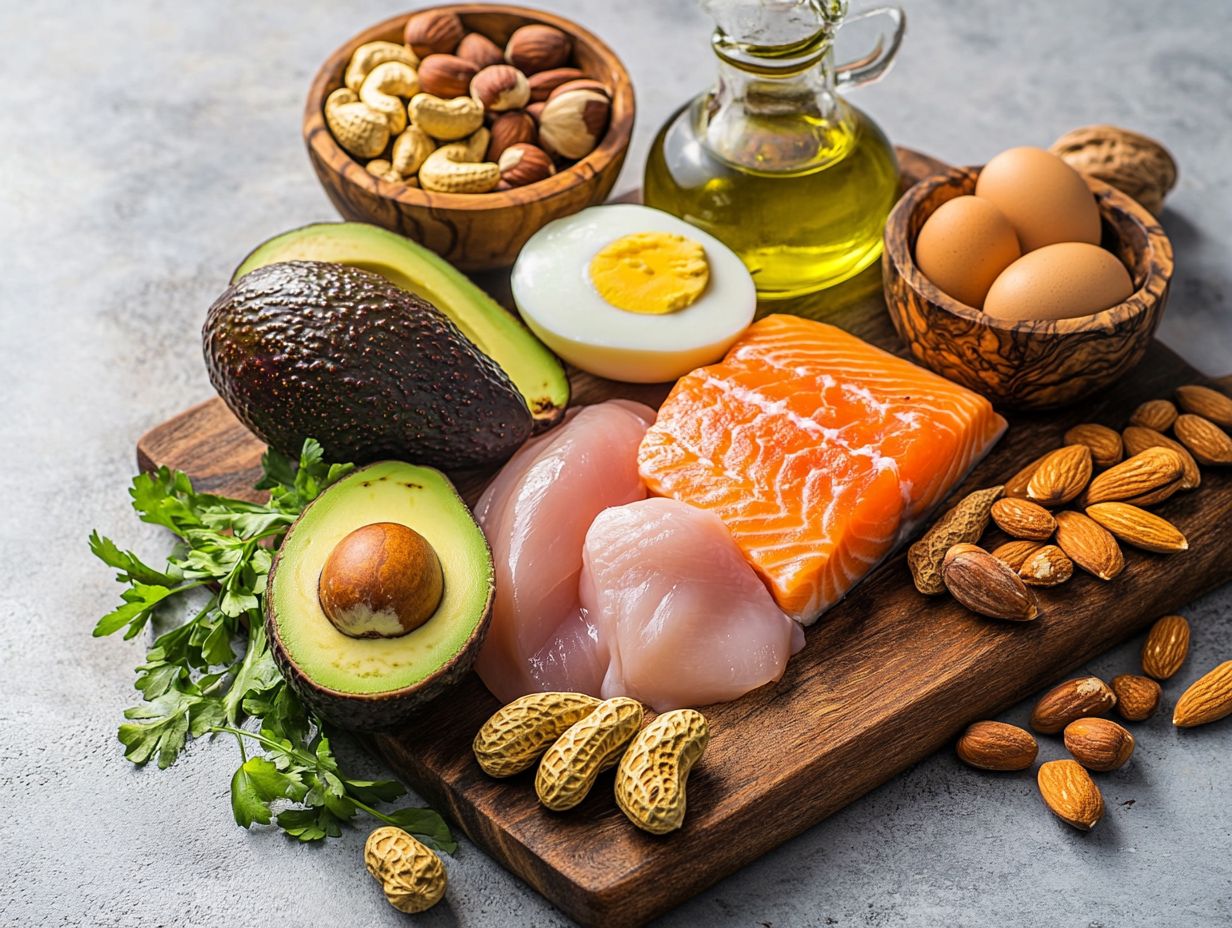
Yes, your protein intake can significantly influence your hunger levels while following a Keto Diet. Higher protein consumption is linked to increased satiety and decreased hunger, making it easier for you to stick to a low-carb dietary approach.
Including adequate amounts of protein in your meals often leads to feeling more satisfied. This reduces persistent cravings that can derail your dietary goals.
This protein effect not only aids in appetite control but also plays a vital role in your weight management strategy. By fine-tuning your protein levels, you can strike a balance that enhances your adherence to your chosen eating plan while supporting your body s metabolic processes.
As a result, being mindful of your protein intake may lead to greater success in achieving and maintaining your weight loss objectives. This highlights the significant impact that dietary strategies can have on your overall health.
Potential Risks of Consuming Too Much Protein on a Keto Diet
While protein is essential for your health, it’s important to be mindful of your intake on a Keto Diet. Consuming excessive amounts of protein may pose certain risks, including disrupting ketosis, creating imbalances in your nutrient intake, and placing additional strain on your kidneys, especially if you have pre-existing health conditions.
Can Excessive Protein Intake Lead to Health Issues on a Keto Diet?
Excessive protein intake can indeed lead to health complications on a Keto Diet. You risk not consuming enough fat to maintain ketosis, and potential issues like kidney strain and nutrient imbalances may arise.
When you consume protein far beyond your daily requirements, it disrupts the delicate balance necessary for effective ketone production. This balance is essential for sustaining your energy levels in a low-carb lifestyle.
Overindulgence in protein can also trigger an increase in glucose production through a process known as gluconeogenesis, which is how your body converts protein into glucose. This may kick your body out of its coveted fat-burning state.
While protein is undeniably important for muscle repair and overall bodily functions, too much of it can burden your kidneys especially if you have pre-existing conditions. This leads to a heightened risk of kidney stones and dehydration.
It s crucial for anyone following a ketogenic plan to moderate their protein intake while ensuring they meet their nutritional needs.
In summary, managing your protein intake is vital for success on a Keto Diet. Make protein your ally in achieving your weight loss goals!
The Role of Protein in a Keto Diet
What Are the Signs of Consuming Too Much Protein on a Keto Diet?
Consuming too much protein on a Keto Diet can send up some red flags, such as digestive discomfort, unexplained weight gain, dehydration, and not getting enough nutrients. These signs suggest an imbalance in your macronutrient intake that deserves your immediate attention.
When you place too much emphasis on protein, it can disturb the delicate balance of your overall diet. This may lead to challenges like constipation and fatigue. This focus on protein might come at the expense of essential fiber and healthy fats that are crucial for your body s optimal functioning. A lack of adequate carbohydrates can leave you feeling drained and irritable.
If these symptoms go unaddressed, they could escalate into more serious health concerns, such as kidney stress and deficiencies in vital vitamins and minerals necessary for maintaining your well-being. This underscores the importance of embracing a balanced, varied diet that truly supports your health.
How to Incorporate Protein into a Keto Diet
Incorporating protein into your Keto Diet requires thoughtful meal planning. Select high-protein foods that align seamlessly with the diet s macronutrient ratios. This ensures a balanced intake that supports not only muscle health but also your overall wellbeing.
What Are Some High Protein Keto-Friendly Meals and Snacks?
High-protein, keto-friendly meals and snacks offer a delightful array of options. These include:
- Grilled chicken
- Salmon
- Eggs
- Cheese
- Nuts
These choices deliver ample protein. They also fit seamlessly within a low-carb dietary framework.
By incorporating these foods into your diet, you support muscle maintenance and promote satiety. You also enhance your overall health with essential nutrients. For example, when you pair grilled chicken with a side of avocado, you elevate the dish with healthy fats. Adding leafy greens topped with feta cheese not only boosts your vitamin intake but also introduces a pleasing texture.
Snacking on a handful of almonds or a hard-boiled egg can help maintain your energy levels throughout the day. This makes it easier to adhere to your keto lifestyle. Keep in mind that meal planning with these protein-rich foods simplifies your grocery shopping. It ensures you always have delicious, balanced meals at your fingertips.
How Can You Ensure Adequate Protein Intake on a Keto Diet?
Ensuring adequate protein intake on a Keto Diet is easily achievable. Adhere to protein guidelines, thoughtfully plan meals that incorporate a variety of protein sources, and be mindful of portion sizes to meet your specific protein targets.
To maintain optimal protein levels, consider tracking your protein consumption using mobile apps or food diaries. These tools can provide valuable insights into your daily intake and help identify any gaps.
Incorporating a diverse array of protein sources, such as lean meats, fish, eggs, and plant-based proteins, contributes to a balanced diet. It also makes meal planning a more enjoyable experience.
Adjusting your protein intake based on your activity level is key. For instance, if you’re engaging in strength training, you may need a higher intake to support muscle repair and growth.
By being proactive and strategic about your protein choices, you can align yourself with dietary recommendations. This allows you to fully enjoy the benefits of a well-structured Keto Diet.
Frequently Asked Questions
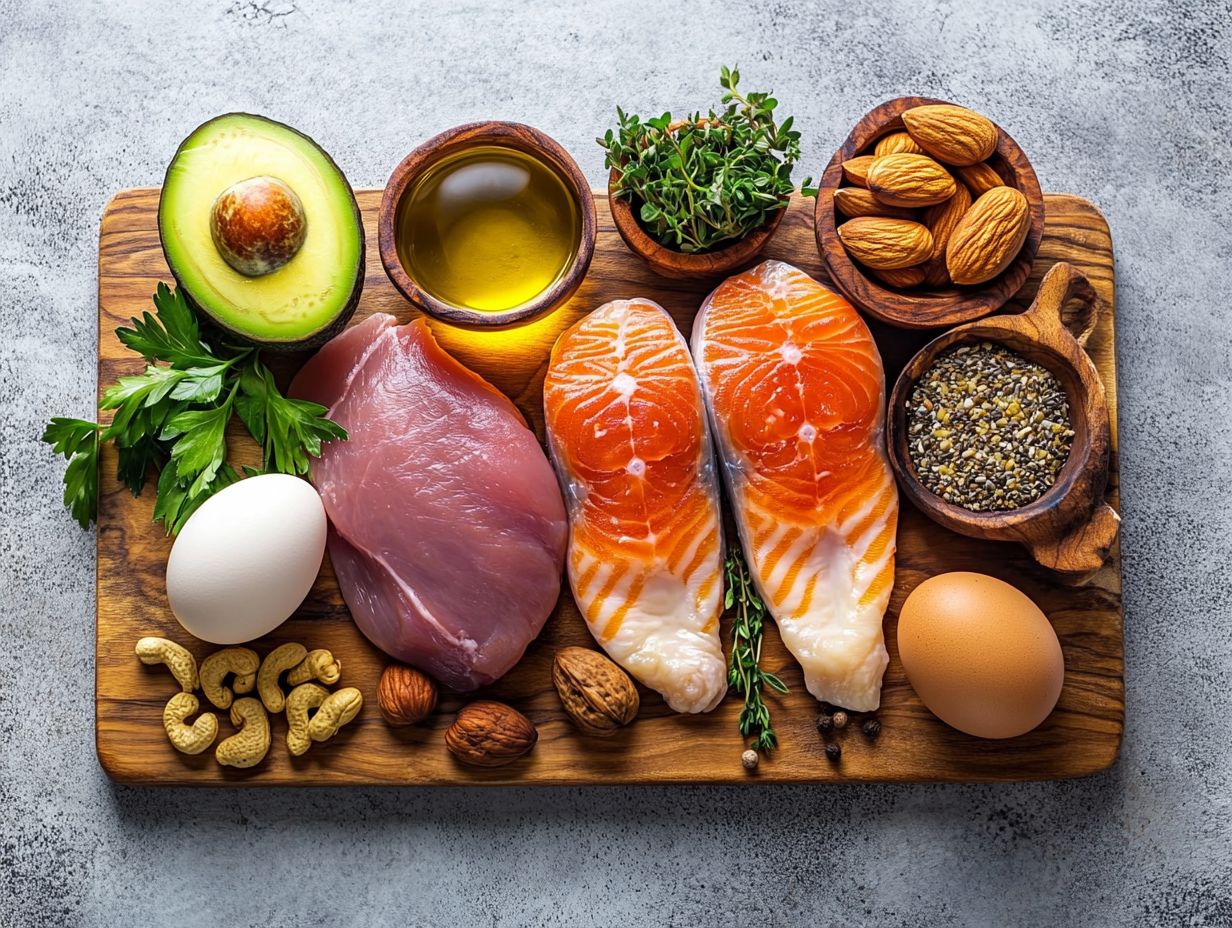
What is the role of protein in a keto diet?
Protein plays a crucial role in a keto diet. It helps in building and maintaining muscle mass, supports weight loss, and keeps you feeling full and satisfied. Dietary protein is essential for muscle growth and repair. It benefits overall health, including healthy skin and blood sugar control.
How much dietary protein should be consumed in a keto diet?
The recommended amount of protein for a keto diet, or ketogenic diet, is 0.6-1 gram per pound of body weight. However, it may vary depending on individual factors like activity level, resistance training, and fitness goals. These dietary recommendations help in achieving optimal protein intake.
Can too much dietary protein kick you out of ketosis?
Yes, consuming excessive amounts of protein can kick you out of ketosis as it can be converted into glucose through a process called converting protein to glucose. It is essential to maintain appropriate protein levels and follow dietary guidelines for a successful keto diet. Protein metabolism can significantly affect your ketosis state.
What are some good protein sources for a keto diet?
Some excellent sources of protein for a keto diet are eggs, chicken, fish, beef, pork, and tofu. Animal protein like fish and meat is highly recommended.
Vegetarian options include nuts, seeds, and dairy products such as cheese and Greek yogurt. Plant protein sources like tofu and legumes can also be included in meal planning for a balanced diet.
Is it necessary to track protein consumption on a keto diet?
Yes, it is essential to track protein consumption on a keto diet to ensure you meet your protein requirements without overdoing it.
Follow protein guidelines and dietary strategies to maintain ketosis and achieve your fitness goals, like fat loss and muscle gain.
Can a protein deficit in a keto diet be harmful?
A protein shortage on a keto diet may cause muscle loss and leave you feeling tired.
Don t let a lack of protein weaken your immune system! It is vital to consume enough dietary protein to support your body’s needs and prevent any nutrient deficiencies. Proper protein portions and following dietary recommendations can help in maintaining muscle tissue and overall health.

